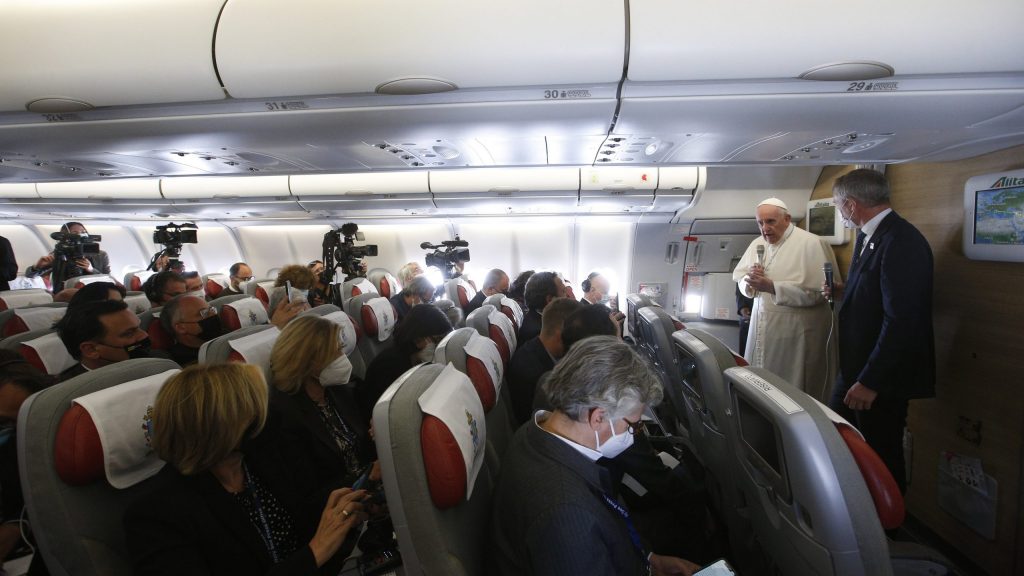Pope Francis on Monday confirmed that he planned to visit Hungary for the closing Mass of the International Eucharistic Congress, which will take place Sept. 12 in Budapest’s Heroes’ Square.
Aboard the papal plane returning to Rome from Iraq, Pope Francis spoke about possible destinations for future papal visits.
He said that his attendance at the Sept. 12 Mass in Hungary would not include a tour of the country. But he noted that Budapest is a two-hour drive from the Slovakian capital, Bratislava, and raised the question of whether the trip should be combined with a visit there.
Pope Francis made his comments about travel during an in-flight press conference on the flight back from a historic three-day visit to Iraq, where he met with political authorities, religious leaders, and Christian communities.
The 84-year-old pope said that he had felt more tired during the Iraqi trip than on previous ones and did not know if his travel schedule would slow down in the future.
Before the coronavirus pandemic canceled possible papal trips to Indonesia, East Timor, and Papua New Guinea in 2020, Francis kept up a busy travel schedule, making 32 international trips to 51 different countries in seven years.
Francis told journalists March 8 that he was “aware of the risks” of traveling while the coronavirus pandemic was ongoing, but that the decision to go to Iraq came “from within.”
“I prayed a lot about this,” he said. “And in the end, I took the decision freely.”
The pope received the coronavirus vaccine before traveling to Iraq, as did those who made the journey with him.
Pope Francis said that Cardinal Bechara Boutros Rai, Lebanon’s Maronite Patriarch, had asked him to add a stop in the country’s capital, Beirut, onto his Iraq visit.
He had decided not to because he felt the country deserved a more substantial visit.
“I wrote a letter and made a promise to make a trip to Lebanon,” he said, praising the country for its generosity in welcoming refugees.
After visiting Iraq, a trip to Syria was not on his mind, he said.
Reflecting on why he hadn’t visited Argentina since his election in 2013, Francis said that he usually joked that it was enough to spend 70 years in his homeland.
He noted that he had planned to visit the country in November 2017, along with Chile and Uruguay. But the idea was abandoned because it would have clashed with an election season in Chile. The pope visited Chile in January 2018, but he explained that it was by then summer in Argentina and Uruguay, so he visited Peru instead.
But he cautioned against “fantasies of patriophobia,” saying that he would visit Argentina when the opportunity presented itself and hinting that the trip could also include Uruguay and southern Brazil.
The 52nd International Eucharistic Congress will take place in Budapest Sept. 5-12 after it was delayed for a year because of the coronavirus pandemic.
Cardinal Péter Erdő, the archbishop of Esztergom-Budapest, told CNA in February the congress “will be a great sign of hope for the Catholics all around the world.”
The International Eucharistic Congress first took place in France in 1881. The event aims to offer a witness to the Real Presence of Jesus Christ in the Eucharist and promote a better understanding of the liturgy and the Eucharist in the life of the Church. The congress is usually held every four years.
Erdő said that the purpose of this year’s congress was summed up by the official prayer, which says that the event seeks to “serve the spiritual renewal of our community, cities, nation, Europe, and the world.”

